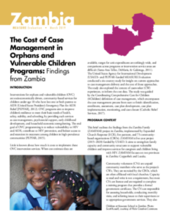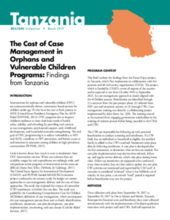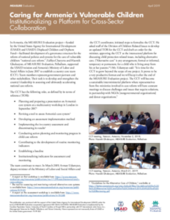Displaying 6681 - 6690 of 14390
This harmonised Case Management (CM) toolkit includes standard operating procedures describing how each step of the CM process should be implemented, tools or forms that should be used for CM, and additional guidance that must be taken into account by actors involved in CM.
This brief outlines the findings from the Zambia Family project in Zambia, implemented by Expanded Church Response, five partners, and 73 community-based organizations.
This brief outlines the findings from the Kizazi Kipya project, in Tanzania, which Pact implements in collaboration with five partners and 48 civil society organizations.
This brief outlines the findings from the Turengere Abana program in Rwanda.
This brief outlines the findings from the Government Capacity Building and Support project, in South Africa, which Pact implemented with support from three partners and the South African Department of Social Development.
This brief outlines the findings from the Systems Transformed for Empowered Actions and Enabling Responses (STEER) project, in Nigeria.
USAID and PEPFAR-funded MEASURE Evaluation worked with six OVC projects in six countries to gain insight on current approaches to OVC case management, map how costs can be linked to OVC case management activities, and determine the cost of OVC case management.
This brief outlines the findings from the Better Outcomes for Children and Youth project, in Uganda
This brief explains the structure and roles of this country core team (CCT) established by Armenia’s Ministry of Labor and Social Affairs in June 2017 and the team’s usefulness as a platform for collaboration for the reform of national policies and systems for the care of vulnerable children: “national care reform.”
Having the best interest principle and taking into account the individual needs of each child in intercountry adoptions, this paper endeavours to promote the two tier approach of the principle of subsidiarity by examining the drafting spirit behind international standards (Section 1), providing examples of legislation and jurisprudence (Section 2) and identifying promising practices (Section 3) that reflect the principle.










